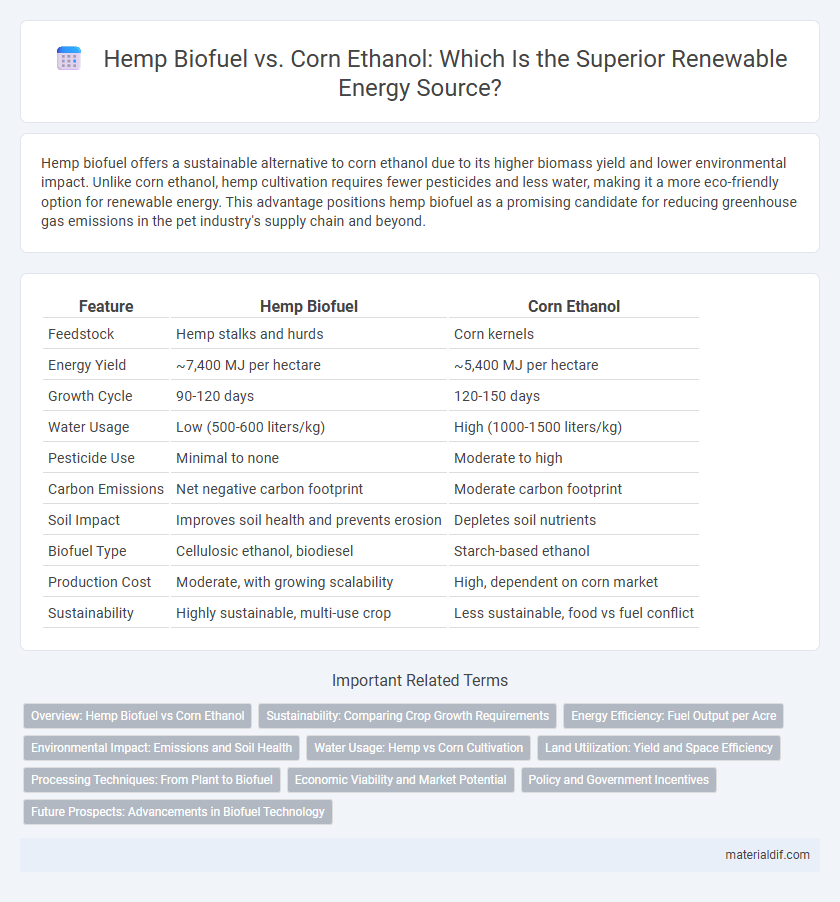Hemp biofuel offers a sustainable alternative to corn ethanol due to its higher biomass yield and lower environmental impact. Unlike corn ethanol, hemp cultivation requires fewer pesticides and less water, making it a more eco-friendly option for renewable energy. This advantage positions hemp biofuel as a promising candidate for reducing greenhouse gas emissions in the pet industry's supply chain and beyond.
Table of Comparison
| Feature | Hemp Biofuel | Corn Ethanol |
|---|---|---|
| Feedstock | Hemp stalks and hurds | Corn kernels |
| Energy Yield | ~7,400 MJ per hectare | ~5,400 MJ per hectare |
| Growth Cycle | 90-120 days | 120-150 days |
| Water Usage | Low (500-600 liters/kg) | High (1000-1500 liters/kg) |
| Pesticide Use | Minimal to none | Moderate to high |
| Carbon Emissions | Net negative carbon footprint | Moderate carbon footprint |
| Soil Impact | Improves soil health and prevents erosion | Depletes soil nutrients |
| Biofuel Type | Cellulosic ethanol, biodiesel | Starch-based ethanol |
| Production Cost | Moderate, with growing scalability | High, dependent on corn market |
| Sustainability | Highly sustainable, multi-use crop | Less sustainable, food vs fuel conflict |
Overview: Hemp Biofuel vs Corn Ethanol
Hemp biofuel offers higher energy yields per acre compared to corn ethanol, thanks to its rapid growth cycle and lower input requirements. Unlike corn ethanol, which relies heavily on food crops and extensive water use, hemp biofuel production uses non-food biomass, reducing competition with food resources and environmental impact. The biochemical composition of hemp stalks allows for more efficient conversion to bioethanol and biodiesel, positioning hemp as a sustainable alternative in renewable energy markets.
Sustainability: Comparing Crop Growth Requirements
Hemp biofuel demonstrates superior sustainability compared to corn ethanol due to its lower water and pesticide needs, thriving on minimal agricultural inputs and requiring less fertile soil. Hemp's rapid growth cycle and ability to grow in diverse climates reduce land degradation and resource depletion, unlike corn ethanol which demands intensive irrigation and chemical use. These factors position hemp as a more sustainable and environmentally friendly biofuel crop, promoting ecosystem health and reducing the carbon footprint of bioenergy production.
Energy Efficiency: Fuel Output per Acre
Hemp produces significantly higher biofuel output per acre compared to corn ethanol, with yields averaging around 200 gallons of fuel per acre versus corn's 18-20 gallons. This energy efficiency advantage stems from hemp's rapid growth cycle and high biomass production, which translates into more fermentable material for biofuel conversion. Consequently, hemp offers a more sustainable and cost-effective source of renewable energy in terms of fuel output per cultivated acre.
Environmental Impact: Emissions and Soil Health
Hemp biofuel produces significantly lower greenhouse gas emissions compared to corn ethanol, reducing the carbon footprint of fuel production by up to 60%. The deep root system of hemp enhances soil structure and promotes nutrient cycling, leading to improved soil health and reduced erosion, unlike corn cultivation which often depletes soil nutrients and increases runoff. Hemp's ability to grow with minimal pesticide and fertilizer inputs further mitigates environmental pollution associated with conventional biofuel crops.
Water Usage: Hemp vs Corn Cultivation
Hemp cultivation requires significantly less water compared to corn, with hemp needing approximately 300-500 liters of water per kilogram of biomass versus corn's 500-800 liters per kilogram. This lower water footprint makes hemp a more sustainable choice for biofuel production, especially in regions facing water scarcity. Efficient water use in hemp cultivation contributes to its environmental advantages over corn ethanol in bioenergy applications.
Land Utilization: Yield and Space Efficiency
Hemp biofuel offers significantly higher land utilization efficiency compared to corn ethanol, producing approximately 450 gallons of biofuel per acre versus corn's average of about 400 gallons. Hemp's rapid growth cycle and dense biomass yield enable greater fuel output per hectare, reducing the overall land footprint required for sustainable energy production. Optimizing land use with hemp cultivation supports enhanced space efficiency and contributes to more eco-friendly biofuel alternatives.
Processing Techniques: From Plant to Biofuel
Hemp biofuel production involves advanced enzymatic hydrolysis and fermentation techniques that efficiently convert cellulose and lignin-rich biomass into bioethanol and biodiesel, offering higher energy yields per acre compared to corn ethanol. Corn ethanol relies heavily on starch conversion using amylase enzymes, which limits feedstock variety and often entails intensive water and fertilizer inputs. The robust fiber composition of hemp enables more sustainable and scalable processing methods, reducing overall carbon footprint and enhancing biofuel quality.
Economic Viability and Market Potential
Hemp biofuel offers higher economic viability than corn ethanol due to its lower cultivation costs and greater biomass yield per acre, resulting in more efficient fuel production. Market potential for hemp biofuel is expanding as increasing demand for renewable and sustainable energy sources aligns with hemp's ability to grow on marginal lands without intensive resource input. Investment in hemp biofuel infrastructure could enhance profitability by leveraging its compatibility with existing agricultural systems and diversifying energy portfolios.
Policy and Government Incentives
Government incentives for hemp biofuel often include renewable energy grants and tax credits that support sustainable crop cultivation, contrasting with corn ethanol policies which have traditionally emphasized food-based biofuel production through subsidies and mandated blending quotas. Hemp's lower input costs and higher biomass yield position it favorably in emerging policy frameworks promoting carbon reduction and energy diversification. Recent legislative shifts in several states reflect growing recognition of hemp as a versatile bioenergy feedstock, encouraging investment through federal and state renewable fuel standards.
Future Prospects: Advancements in Biofuel Technology
Hemp biofuel offers significant advantages over corn ethanol due to its higher biomass yield and lower agricultural input requirements, making it a more sustainable energy source. Advances in enzymatic hydrolysis and fermentation technologies are enhancing the efficiency of converting hemp cellulose into bioethanol, boosting its commercial viability. Continued research in genetic modification and crop optimization is expected to improve hemp's biofuel production rates, positioning it as a promising candidate for future renewable energy markets.
Hemp biofuel vs Corn ethanol Infographic

 materialdif.com
materialdif.com